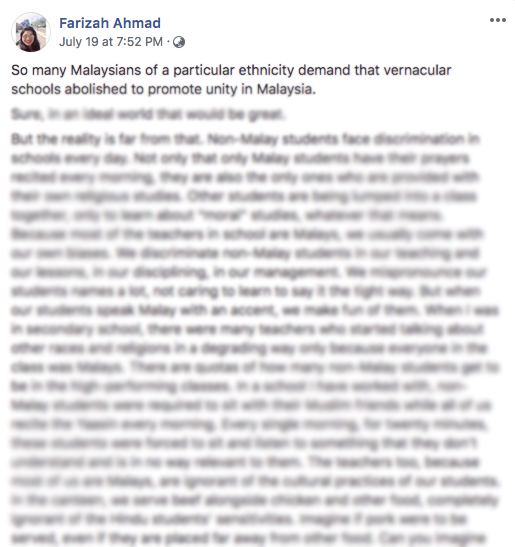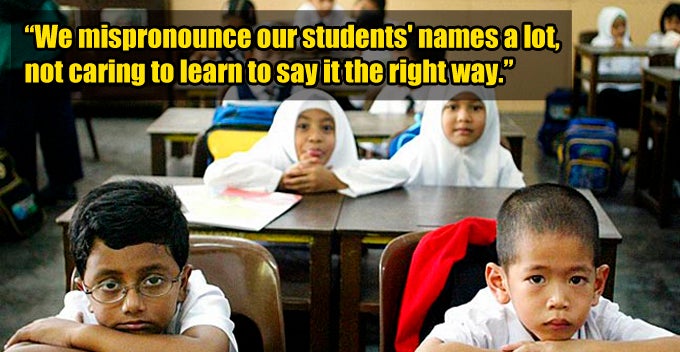For the longest time, vernacular schools have been blamed by certain parties as the cause of disunity among pupils of different ethnicities. However, a teacher named Farizah in 19 July explained in a lengthy post about why vernacular schools are still preferable among non-Malay students.

Source: facebook
Here’s what she wrote.
“Non-Malay students face discrimination in schools every day. Not only do Malay students have their prayers recited every morning, they are also the only ones who are provided with their own religious studies.
“Other students are being lumped into a class together, only to learn about ‘moral’ studies, whatever that means.
“We discriminate non-Malay students in our teaching, our lessons, and in our management. We mispronounce our students’ names a lot, not caring to learn to say it the right way. But when our students speak Malay with an accent, we make fun of them.
“When I was in secondary school, there were many teachers who started talking about other races and religions in a degrading way only because everyone in the class was Malay.
“There are quotas of how many non-Malay students get to be in the high-performing classes. In a school I had worked with, non-Malay students were required to sit with their Muslim friends while all of us recite the Yaasin every morning.
“Every single morning, for twenty minutes, these students were forced to sit and listen to something that they don’t understand and is in no way relevant to them.
“In the canteen, we serve beef alongside chicken and other food, completely ignorant of the Hindu students’ sensitivities. Imagine if pork were to be served, even if they are placed far away from other food. Can you imagine the reaction we will get from the Malays?
“It’s so easy for us to demand everyone to be in the same school when we are always being put first, and our needs are the priorities. But honestly, if I am a non-Malay parent, I would choose vernacular schools over sekolah kebangsaan for my child, no question about it.
“My child’s needs will always come first, they get equal opportunities given to their peers, they are constantly surrounded by their own culture, and they get the best of everything. The teachers too would pronounce my child’s name perfectly. So why the f*** not!”
As expected, this post started circulating on Facebook and was even picked up by a local news portal. Some netizens fully agreed on what Farizah said as they themselves have experienced some form of racial discrimination in schools, while one particular netizen suggested that none of the problems mentioned above would exist if vernacular schools were abolished.

Source: facebook

Source: facebook
This is certainly a very interesting Facebook post, and we’re sure Farizah’s intention was to point out the areas that needed improvement and not to stir up any racial tension.
What are your thoughts on this topic? Let us know in the comments! Be nice guys! XD
Also read: “I Remember One Person Once Shouted at Me ‘Tak Puasa Ke Babi?!’ and Just Walked Away”











































